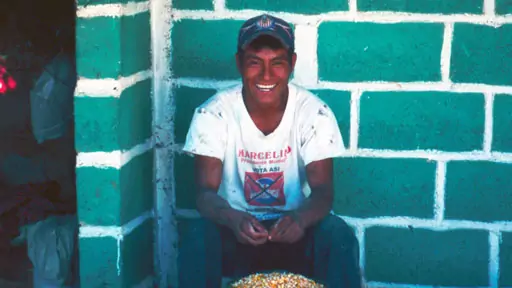Indigenous Calendar March, 2014: Civilization Explained by a Tzeltal Maya Man in Mexico

How do we define the term "civilization?" We can easily define it based on the origin of the word; it came into English centuries ago from Latin. (Linguistically, the Latin word civis is a third-declension, parisyllaba male or female noun.) Its most accurate translation from Latin to English is 'citizen.'
Then what does 'citizen' mean? Aren't I one? Aren't you?
An interesting, related term is 'the cradle of civilization.' I find this term interesting because its Latin root suggests a time when people first became citizens or when they first became civilized. But the term does not refer to 'citizenship' in the modern sense of that word nor to 'civilized' in the modern sense of that word. It refers instead to a time in human history when we first set out on the course that led to our world as it exists today.
Historically, there have been many human civilizations. Some of the earliest ones are directly associated with the term 'the cradle of civilization.' Mostly the geographic area called the 'Fertile Crescent' (the far northern Arabian Peninsula and northern Egypt) is associated with the term.
Recent scientific discoveries have revealed that there was no single 'cradle of civilization' in our migration path. Instead we learned to 'civilize' ourselves in different areas of the planet as we moved away from our origin in Africa. One of those areas was Mesoamerica (western Central America and the southeastern part of Mexico).
It is still debated as to how exactly Mesoamerica was historically populated by humans. But it is certain that the most well-known, successful, large-scale civilization there was achieved by the peoples collectively known as the Maya. Indeed it was so large at its peak that it is one of only a few historical civilizations that expanded to become an empire. Ironically the Spanish are often said to have 'civilized' the Maya once they arrived in Mesoamerica. Even more ironic is the observation that while much of Europe had civilizations at the time, it had no successful empire.
Although the Maya civilization can no longer be called an empire, much of what the Spanish originally encountered remains the same to this day. This Tzeltal man is husking corn in the village of Amatenango del Valle, Chiapas State, Mexico. Apart from his modern house and dress he appears much as his ancestors would have to the first Spanish colonizers. Corn has always been a staple of the Mesoamerican diet. But for the Maya the association of their civilization with corn goes beyond its role as food; it also features in Maya mythology. While the Spanish would have considered such association to be superstitious and even sacrilegious it shows that the Maya clearly understood the importance of food in the sustainability of their civilization.
A seemingly simple word can take on a broader definition when we understand its full history.
The Tzeltal Maya are featured in our documentary, Ancient and Modern Mayan Peoples.
Read more about the Tzeltal people.
If you enjoyed reading this article, please consider supporting independent, advertising-free journalism by buying us a coffee to help us cover the cost of hosting our web site. Please click on the link or scan the QR code. Thanks!


